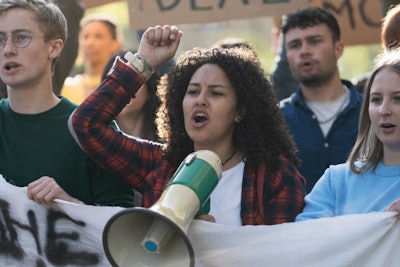
A new report from the Foundation for Individual Rights and Expression (FIRE) reveals a significant reversal in the dynamics of campus speech controversies over a five-year period, with notable implications for higher education institutions nationwide.
The report, "Shifting Winds: Students Under Fire, 2020-2024," documents 1,014 instances where students or student groups faced disciplinary action or investigation for protected speech. The analysis shows two distinct periods with dramatically different patterns of speech policing on campus.
From 2020 through 2022, most speech controversies were initiated by students against their peers, primarily targeted expression related to race, and came from the political left. However, from 2023 onward, administrators became the primary source of speech complaints, primarily targeting expression about the Israeli-Palestinian conflict, and predominantly coming from the political right.
"The data show these winds can shift rather quickly," notes the report, which draws its title from a quote by former ACLU Executive Director Ira Glasser: "Speech restrictions are like poison gas: they seem like a good idea when you've got the gas and a deserving target in sight. But then the wind shifts and blows the gas back on you."
According to FIRE's data, overall, more students and student groups were targeted for expression from their political left (476 entries) than from their right (337 entries), with the remaining 201 controversies being either unclear or apolitical in nature.
The October 7, 2023, Hamas attack on Israel and Israel's subsequent military response in Gaza marked a significant turning point. Two in five (41%) student speech controversies in 2023 involved expression about the Israeli-Palestinian conflict made after October 7. This subject quickly overtook race as the topic most likely to result in disciplinary action.
Government officials and politicians played an increasingly significant role in these controversies, with 2023 seeing a record 20 attempts by government officials to punish students for their speech—10% of all entries that year. This percentage rose to 17% for cases specifically involving speech about the Israeli-Palestinian conflict.
Perhaps most concerning for free speech advocates is that nearly two-thirds (63%) of all student speech controversies over the five-year period resulted in at least one administrative punishment. These ranged from investigations (which the report notes function as de facto punishment through process) to censorship, suspension, mandated training, separation from the institution, or loss of funding.
The report also notes that Students for Justice in Palestine became the most frequently targeted student group in 2023-2024, whereas in previous years, conservative groups like College Republicans, Turning Point USA, and Young Americans for Freedom faced the most scrutiny.
FIRE's research suggests that free speech protections on campuses are vulnerable to shifting political pressures, with administrators often yielding to demands for punishment from various stakeholders. The report concludes with a call for consistent application of free speech principles regardless of the political climate, and for administrators to resist pressure to censor students even in the face of controversy or federal pressure.
"How things will shift five years from now is anyone's guess," the report concludes, "but the hope is that it will shift in favor of student speech."















